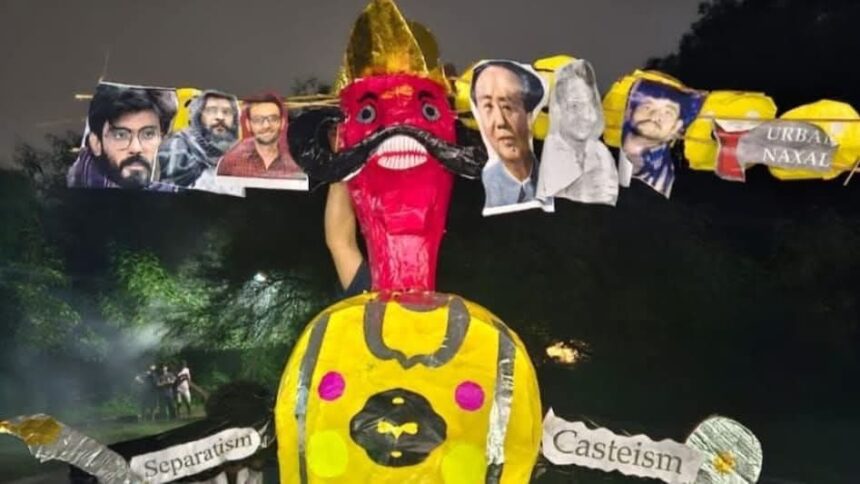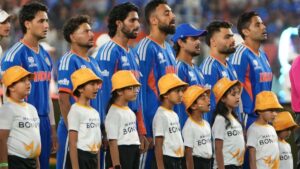The Akhil Bharatiya Vidyarthi Parishad (ABVP) at Jawaharlal Nehru University (JNU) held a “Ravan Dahan” event on Thursday, symbolically portraying former JNU students and anti-Citizenship Amendment Act (CAA) activists Umar Khalid and Sharjeel Imam as Ravana. The JNU Students’ Union (JNUSU) condemned the event, labeling it a “deliberate attempt to exploit religion and spread Islamophobia.”
In response to the ABVP’s event, the JNUSU organized a protest, forming a human chain despite interruptions from rain. During the demonstration, ABVP supporters reportedly shouted slogans including “Godse ki Jai” (“Hail Godse”), “Sharjeel Imam ko phansi do” (“Hang Sharjeel Imam”), and “Umar Khalid ko phansi do” (“Hang Umar Khalid”). JNUSU representatives expressed concern, stating, “Umar and Sharjeel have been imprisoned for five years. Their cases are still under trial, and bail has been repeatedly denied on flimsy grounds. Yet the ABVP chose to hold a public trial on the streets.”
JNUSU President Nitish Kumar described how a poster announcing the “Ravan Dahan” circulated in their groups early in the day. He stated, “Umar Khalid and Sharjeel Imam… were portrayed as Ravan. Resisting that, we issued a call from JNUSU that they cannot do this and that it is wrong.” Kumar criticized the ABVP for not targeting figures like Nathuram Godse, Gandhi’s assassin, saying they are burning the effigies of human rights defenders instead.
The protest took place at Sabarmati Tea Point, coinciding with a Durga Visarjan event led by the ABVP. Kumar alleged that ABVP members escalated tensions, waving slippers and chanting provocative slogans. He mentioned, “We formed a human chain to stop the violence, but for half an hour they tried to provoke and stoke unrest. Later, they left.”
JNUSU accused the ABVP of fleeing when outnumbered and subsequently misrepresenting the protest as an opposition to Durga Puja. Reports suggested that stones were thrown, and sandals were displayed in attempts to intimidate the students protesting.
JNUSU criticized the selective targeting in the ABVP’s actions, asserting that if the ABVP was genuine about justice, they would have targeted figures such as Baba Ram Rahim, a convicted rapist, or politicians accused of inciting violence during the 2020 Delhi riots. They noted the historical pattern of politicizing religion by the RSS and ABVP, referencing previous instances where prominent leaders were portrayed negatively.
In their statements, JNUSU condemned the ABVP’s actions as politically motivated, characterizing the use of religious symbolism to target dissenters as an ongoing trend of exploiting communal tensions.
Meanwhile, the ABVP’s JNU unit, led by President Om Sinha, alleged that members of “leftist groups” attacked their procession, resulting in injuries among participants. JNUSU responded by disputing this claim, stating there had been no reports of violence during their events, challenging the ABVP to provide evidence.
The union highlighted that “The truth is clear: ABVP survives by stoking Islamophobia and manufacturing communal divides.” They called on students and citizens to reject divisive tactics and defend communal harmony.
Umar Khalid and Sharjeel Imam are currently embroiled in legal battles under stringent anti-terror laws. Both were arrested amid accusations tied to the 2020 anti-Muslim riots in Delhi. On September 2, 2025, the Delhi High Court dismissed bail pleas for several anti-CAA activists, some having spent over 2,000 days in detention. Recent hearings for bail requests involving Khalid, Imam, and others are scheduled for later this month.
The events underscore the ongoing tensions surrounding the CAA and its opponents, framed within a larger context of religious and political discourse in India.
Tags: ABVP, Ravan Dahan, Umar Khalid, Sharjeel Imam, effigy burning
Hashtags: #ABVP #JNU #stages #Ravan #Dahan #burning #effigies #Umar #Khalid #Sharjeel #Imam #raising #slogans #hanging










